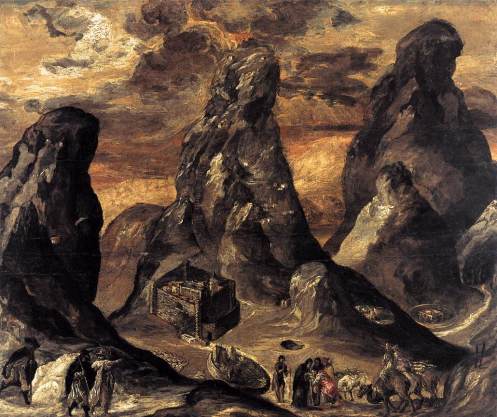Sunday – Passover
I love this Marge Piercy Passover poem, which talks about the courage it takes to leave something familiar, even if that familiarity involves your slavery. It is, as Piercy puts it, “the courage to walk out of the pain that is known/ into the pain that cannot be imagined.”
In the course of the poem, Piercy expands her focus from the Israelites escaping from Egypt to Jews fleeing Russian pogroms and Hitler’s death camps. “We Jews are all born of wanderers,” Piercy writes, “with shoes/ under our pillows and a memory of blood that is ours/ raining down.”
Even when successful, the journey to freedom has mixed results. They become strangers in a strange land and give birth to children “who could look down/ on them standing on their shoulders for having/ been slaves.” Nevertheless, on this night that is like no other night, “we honor those who let go of every-/ thing but freedom.”
“Maggid,” incidentally, is an itinerant preacher. The maggidim, according to the Jewish Encyclopedia, were less scholarly and more associated with the multitude than the establishment rabbis. Piercy, attuned to the almost invisible pains suffered by an uprooted people, may see herself as a kind of maggid.
As you read the poem, think of those Central American migrants who have given up everything to make the long journey to the United States. The Jewish story is a universal story.
Maggid
By Marge Piercy
The courage to let go of the door, the handle.
The courage to shed the familiar walls whose very
stains and leaks are comfortable as the little moles
of the upper arm; stains that recall a feast,
a child’s naughtiness, a loud blattering storm
that slapped the roof hard, pouring through.
The courage to abandon the graves dug into the hill,
the small bones of children and the brittle bones
of the old whose marrow hunger had stolen;
the courage to desert the tree planted and only
begun to bear; the riverside where promises were
shaped; the street where their empty pots were broken
The courage to leave the place whose language you learned
as early as your own, whose customs however dan-
gerous or demeaning, bind you like a halter
you have learned to pull inside, to move your load;
the land fertile with the blood spilled on it;
the roads mapped and annotated for survival.
The courage to walk out of the pain that is known
into the pain that cannot be imagined,
mapless, walking into the wilderness, going
barefoot with a canteen into the desert;
stuffed in the stinking hold of a rotting ship
sailing off the map into dragons’ mouths,
Cathay, India, Siberia, goldeneh medina
leaving bodies by the way like abandoned treasure.
So they walked out of Egypt. So they bribed their way
out of Russia under loads of straw; so they steamed
out of the bloody smoking charnelhouse of Europe
on overloaded freighters forbidden all ports—
out of pain into death or freedom or a different
painful dignity, into squalor and politics.
We Jews are all born of wanderers, with shoes
under our pillows and a memory of blood that is ours
raining down. We honor only those Jews who changed
tonight, those who chose the desert over bondage,
who walked into the strange and became strangers
and gave birth to children who could look down
on them standing on their shoulders for having
been slaves. We honor those who let go of every-
thing but freedom, who ran, who revolted, who fought,
who became other by saving themselves.
Previous Passover Posts
Henry Weinfield: A Ritual for Wanderers
Harvey Shapiro: Drawn Forth to Eat the History Feast
George Moses Horton: Must I Dwell in Slavery’s Night?
Norman Finkelstein: Blood on the Door Posts
Norman Finkelstein: Death and Miracles and Stars without Number
Nicole Krauss: Replacing the Temple with the Torah
Muriel Rukeyser: The Journeys of the Night Survive
Primo Levi: A Night Different from All Other Nights


